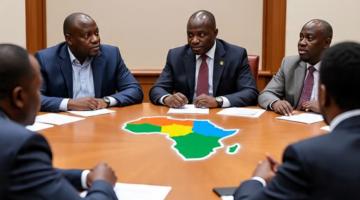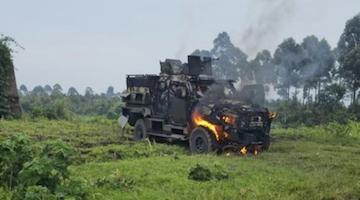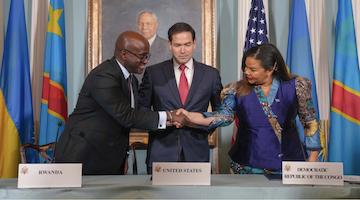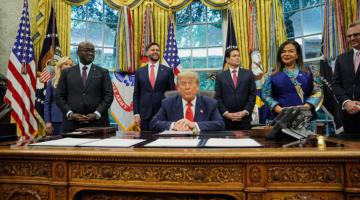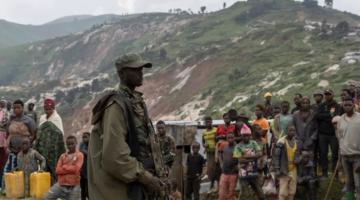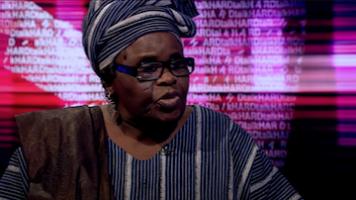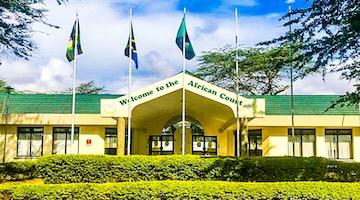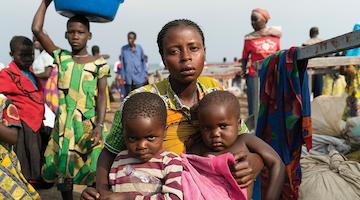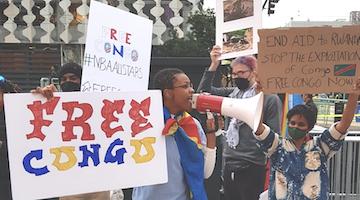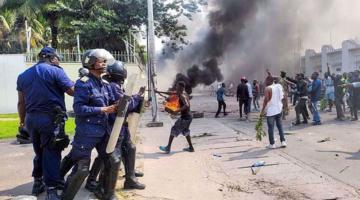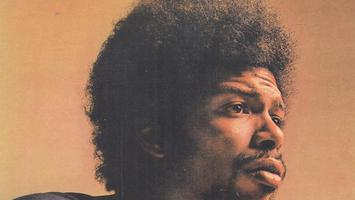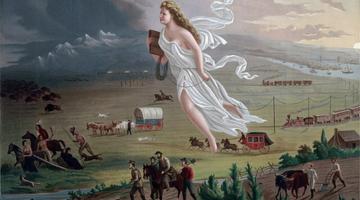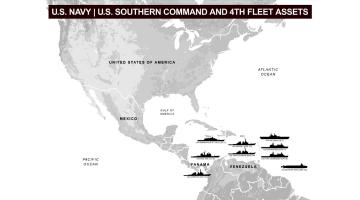Kwame Nkrumah’s 1961 speech on the assassination of Patrice Lumumba exposes the the international white supremacist cabal responsible for his death, and for the crisis of the Congo.
Today, it is common knowledge that the CIA had a hand in the assassination of Patrice Lumumba, the first prime minister of the Democractic Republic of Congo. Yet when Lumumba was murdered on January 16, 1961, CIA complicity could not be directly ascertained. It was only in the following decades, with the slow release of classified documents and the confessions of figures such as CIA station chief Larry Devlin, that a portrait – one that is still incomplete – emerged of the agency’s sanguinary subversions in the Congo.
However, as Kwame Nkrumah stated in a Ghanaian radio broadcast a month after Lumumba’s death, what was certainly known was that the architects of his murder were many. In the February 14th, 1961 broadcast, Nkrumah provided a timeline of Lumumba’s brief and fraught spell in power while cataloging the organizations and governments involved in his downfall and death. He lists an international white supremacist cabal that included the United Nations, NATO, Belgium and its military forces, the governments of the United States, the United Kingdom, and France, the Union Miniere and other foreign mining, industrial, and commercial interests, mercenaries from Nazi Germany and fascist Italy, and Joseph Kasavubu, the ceremonial president of the Congo, and Army Commander Joseph-Désiré Mobutu – later known as Mobutu Sese Seko.
For Nkrumah, the Congo situation represented “the first time in history that the legal ruler of a country has been done to death with the open connivance of a world organization in whom that ruler put his trust.” It also represented an emerging counter-revolution (what Nkrumah referred to as a “colonialist war”) against decolonization in Africa, whose goal was to preserve European and US interests and investments while dismantling African sovereignty and pan-African unity. In February 1966, five years after Nkrumah’s broadcast on the death of Lumumba, Nkrumah himself would fall victim to this counterrevolution, with many of the same interests, including the CIA, the architects of his overthrow.
Osagyefo Kwame Nkrumah, Pan-Africanist born on September 21, 1909 in Nkroful, in what was then the Gold Coast, was the first President and Prime Minister of independent Ghana, and died in exile Bucharest, Romania, on April 27, 1972.
“The architects of this murder are many”: On the Killing of Patrice Lumumba, February 14th, 1961
Kwame Nkrumah
Countrymen, African Freedom Fighters, Comrades and Friends: Somewhere in Katanga in the Congo – where and when we do not know – three of our brother freedom fighters have been done to death.
There have been killed Patrice Lumumba, the Prime Minister of the Republic of the Congo, Maurice Mpolo, the Minister in his government who was elected from Katanga Province, and Joseph Okito, the Vice-President of the Congolese Senate.
About their end many things are uncertain, but one fact is crystal clear: they have been killed because the United Nations, whom Patrice Lumumba himself, as Prime Minister, had invited to the Congo to preserve law and order, not only failed to maintain that law and order, but also denied to the lawful Government of the Congo all other means of self-protection.
History records many occasions when rulers of States have been assassinated. The murder of Patrice Lumumba and his two colleagues, however, is unique in that this is the first time in history that the legal ruler of a country has been done to death with the open connivance of a world organization in whom that ruler put his trust.
These are the facts. Patrice Lumumba was appointed Prime Minister by the departing Belgian authorities because he was the leader of the parliamentary party with the largest representation and was the only member of a parliament who could obtain a majority in both the Senate and the Chamber.
Kasavubu was subsequently elected as the ceremonial Head of State but it was clearly agreed and understood that he should have no more authority or power than has the King of Belgians in Belgium. This fact, clearly written into the Constitution of the Congo, has been deliberately ignored and distorted by those who have sought for their own ends to give some appearance of legality to the military usurpers and the agents of Colonial rule who have illegally seized power in some parts of the Congo.
Shortly after independence, the Congolese army mutinied. Parice Lumumba nad his colleagues had to secure outside support from somewhere if they were to preserve the legal structure of the State.
In the interests of world peace, and in order to prevent the cold war being brought into Africa, Patrice Lumumba invited the United Nations to preserve law and order. The United Nations insisted that they should have the sole mandate to do this and that the legal Government of the Congo should not obtain that military assistance which would have otherwise been forthcoming from many other friendly African states.
However, instead of preserving law and order, the United Nations declared itself neutral between law and disorder, and refused to lend any assistance whatsoever to the legal Government in suppressing the mutineers who had set themselves up in power in Katanga and the South Kasai.
When, in order to move its troops against the rebels, the government of the Congo obtained some civilian aircraft and civilian motor vehicles from the Soviet Union, the colonialist powers at the United Nations raised a howl of rage while, at the same time, maintaining a discrete silence over the build-up of Belgian arms and actual Belgian military forces in the service of the rebels.
With a total disregard of the Constitution, which expressly provided that the President could not dismiss the Prime Minister unless there had been a vote of “no confidence” in the Parliament, Kasavubu illegally tried to remove Patrice Lumumba from office and to substitute another Government. When Lumumba wished to broadcast to the people, explaining what had happened, the United Nations, in the so-called interests of law and order, to prevent him by force from speaking.
They did not, however, use the same force to prevent the mutineers the Congolese Army from seizing power in Leopoldville and installing a completely illegal Government.
Despite the fact that one of the most important reasons for United Nations action was supposedly to see that all Belgian Forces were removed, the United Nations sat by while the so-called Katanga Government, which is entirely Belgian-controlled, imported aircraft and arms from Belgium and from other countries, such as South Africa, which have a vested interest in the suppression of African freedom. The United Nations connived at the setting up, in fact, of an independent Katanga State, though this is contrary to the Security Council’s own resolutions.
Finally, the United Nations, which could exert its authority to prevent Patrice Lumumba from broadcasting, was, so it pleaded, quite unable to prevent his arrest by mutineers or his transfer, through the use of airfields under United Nations control, into the hands of the Belgian-dominated Government of Katanga.
The United Nations is, on behalf of all its members, in control of the finances of the Congo. It is now two months ago since I personally wrote to Mr. [Dag] Hammarskjöld [the UN Secretary General] to ask him where the money came from which is being used to pay the soldiers in Mobutu’s illegal army. I am still awaiting an answer.
One thing is certain, however, this money does not come from the revenue of the Congo. It is supplied from outside by those who wish to restore colonialism in practice by maintaining in office a puppet regime entirely financially dependent upon them.
The time has come to speak plainly. The danger in the Congo is not so much the possibility of a civil war between Africans, but rather a colonialist war, in which the colonial and imperialist powers hide behind African puppet regimes.
At this very moment, North Katanga is being laid waste by military units under command of a regular officer of the Belgian army, Colonel Crevecoeur, armed with the most modern weapons, supplied by Belgium.
Recruiting offices have been opened in South Africa, in France, and elsewhere, and wages of over four hundred pounds a month are being offered to former German Fascist officers and to former collaborators of Hitler and Mussolini in other countries in order to persuade them to enlist in an unholy war against the African people.
Where, I ask again, does the money come from to pay all of this modern and expensive armament which is now being deployed against unarmed peasants and villagers?
The rulers of the United States, of the United Kingdom, of France, and of the other Powers who are militarily allied with Belgium, must answer these questions.
Why did they express so loudly their indignation when the Soviet Union placed at the disposal of the legal Government of the Congo civilian aircraft and civilian vehicles? Why are they so silent when their ally, Belgium, openly supplies military aircraft and armoured vehicles to the rebels?
Why is it that no single member of the North Atlantic Treaty Organisation has on any occasion addressed to Belgium any public rebuke for the flagrant breaches of the Security Council Resolution in which Belgium is every day indulging? Alas, the architects of this murder are many.
In Ghana we realize the great financial stakes which some Great Powers have in the Union Miniere and in other industrial and commercial undertakings in the Congo.
I would, however, ask these Powers these questions: Do they really believe that, ultimately, they can safeguard their investments and their interests in the Congo by conniving at a brutal and savage colonialist war?
Do they realize that they are sacrificing African lives to continue in Africa the cold war at the very time when all powers, both great and small, should be concentrating on the abolition of colonialism and the establishment of world peace.
Patrice Lumumba, Maurice Mpolo and Joseph Okito have died because they put their faith in the United Nations and because they refused to allow themselves to be used as stooges or puppets for external interests.
There is still time for those who have supported this cruel colonialist war in the Congo to change their policy, but time is running out.
The cynical planning of the murder of Patrice Lumumba and his colleagues is a final lesson for us all . We cannot ignore the fact that this crime shows every evidence of the most careful preparation and timing. First there came the handing over of Patrice Lumumba and others to the Belgian-controlled authorities in Katanga.
Next there came the contemptuous refusal of these same authorities to allow the United Nations conciliation Committee any access to the prisoners. From this came the final proof that the United Nations would not effectively intervene to save the lives of the Prime Minister or his colleagues. This was followed by the formation of the so - called new Kasavubu Government and the formation of the so-called New Kasavubu Government and the warning by Belgium to Belgian nationals to leave those parts of the Congo controlled by the legal government.
Finally came the story so reminiscent of Nazi and Fascist technique—the false account of an attempt to escape and the death of the prisoners following upon it.
What are the next steps in this plan? The information before me now is that the Kasavubu-Mobutu group has planned an offensive against Orientale Province in an attempt to secure a quick military victory before the Security Council can deal with the matter.
My information is that this plan has been made with the full knowledge of the French and Belgian Governments and has their full support.
Let me issue a most serious warning: Any such action, unless immediately denounced by the other members of the Security Council, will have a profound effect on African relations with the Great Powers.
Our dear brothers, Patrice Lumumba, Maurice Mpolo and Joseph Okita are dead, and I ask you all to join with me in mourning the loss which the whole African continent has sustainted through their cruel murder. But their spirit is not dead, nor are the things for which they stood; African freedom, the unity and independence of Africa, and the final and complete destruction of colonialism and imperialism.
The colonialists and imperialists have killed them, but what they cannot do is to kill the ideals which we still preach and for which they sacrificed their lives.
In the Africa of the future their names will live for ever-more.
This speech was first broadcast via Ghanian radio on February 14th, 1961. It was subsequently reprinted in Kwame Nkrumah’s The Challenge of the Congo (New York: International Publishers, 1967) and elsewhere.

